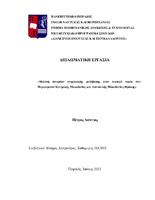Μελέτη σεναρίων ενεργειακής μετάβασης στον οικιακό τομέα των Περιφερειών Κεντρικής Μακεδονίας και Ανατολικής Μακεδονίας - Θράκης
Study of household energy transition scenarios of the Regions of Eastern Macedonia Thrace and Central Macedonia

Προβολή/
Λέξεις κλειδιά
DREEM ; Σενάρια ενεργειακής μετάβασης ; Μοντελοποίηση οικιακού τομέα ; Περιφέρεια Κεντρικής Μακεδονίας ; Περιφέρεια Ανατολικής Μακεδονίας - Θράκης ; Κλιματική αλλαγήΠερίληψη
Η κλιματική αλλαγή, η επιδείνωση του φαινομένου του θερμοκηπίου καθώς και τα επικίνδυνα καιρικά φαινόμενα που μπορεί να προκληθούν από αυτά καθιστούν απαραίτητη τη λήψη μέτρων και την υλοποίηση δράσεων για το μετριασμό τους, σε παγκόσμιο και εθνικό επίπεδο. Βασικούς πυλώνες για την επίτευξη του παραπάνω στόχου, αποτελούν ο προγραμματισμός μιας ενεργειακής μετάβασης με αυξημένο το μερίδιο Ανανεώσιμων Πηγών Ενέργειας (ΑΠΕ) στο ενεργειακό μίγμα και η ταυτόχρονη βελτίωση της ενεργειακής απόδοσης, κατευθύνσεις που η Ευρωπαϊκή Ένωση έχει ήδη πάρει, πρωτοστατώντας παγκοσμίως με δράσεις για την επίτευξή τους. Στο πλαίσιο αυτό και η Ελλάδα, λαμβάνει μέτρα σύμφωνα με ορισμένους ενεργειακούς και κλιματικούς στόχους που έχουν τεθεί στο Εθνικό Σχέδιο για την Ενέργεια και το Κλίμα (ΕΣΕΚ) και τη Μακροχρόνια Στρατηγική για το 2050 (ΜΣ-2050).
Οι στόχοι αυτοί σχετίζονται με τη διαδικασία της ενεργειακής μετάβασης των τομέων από τους οποίους προέρχεται ο μεγαλύτερος όγκος αέριων ρύπων, δηλαδή τον τομέα των μεταφορών, τη βιομηχανία, τον κτιριακό τομέα και την ηλεκτροπαραγωγή. Συγκεκριμένα για τον κτιριακό τομέα, και δη τον οικιακό που αποτελεί το μεγαλύτερο μέρος του, η ενεργειακή μετάβαση καθίσταται αναγκαία, μιας και καταναλώνει περίπου το 25% της τελικής κατανάλωσης στην Ελλάδα. Ο οικιακός τομέας και η υλοποίηση μιας ομαλής και αποδοτικής ενεργειακής μετάβασης σε αυτόν είναι το αντικείμενο που πραγματεύεται η παρούσα διπλωματική.
Υπό το πρίσμα αυτό και με γνώμονα τους στόχους που έχουν τεθεί από το ΕΣΕΚ και τη ΜΣ-2050, η παρούσα εργασία επικεντρώνεται στη μελέτη σεναρίων ενεργειακής μετάβασης που αφορούν τον οικιακό τομέα των Περιφερειών της Κεντρικής Μακεδονίας και Ανατολικής Μακεδονίας-Θράκης για την περίοδο 2021-2040. Για να επιτευχθεί η μετάβαση, απαραίτητη προϋπόθεση αποτελεί η γνώση των προφίλ κατανάλωσης και εν συνεχεία η μοντελοποίηση της ενεργειακής ζήτησης του οικιακού τομέα των παραπάνω Περιφερειών. Αυτό υλοποιείται με τη χρήση του υπολογιστικού εργαλείου υψηλής ευκρίνειας “DREEM” (“Dynamic high-Resolution dEmand-sidE Management”), το οποίο παραμετροποιείται χρησιμοποιώντας ερευνητικά και δημογραφικά δεδομένα της ελληνικής επικράτειας και των εξεταζόμενων Περιφερειών ειδικότερα, εκτιμώντας με μεγάλη ακρίβεια την ενεργειακή ζήτηση των νοικοκυριών ανά καύσιμο.
Τα εξεταζόμενα σενάρια δείχνουν πως με τον εξηλεκτρισμό του μίγματος ηλεκτρικής ενέργειας, τη μετατροπή των υφιστάμενων τεχνολογιών θέρμανσης σε πιο αποδοτικές και λιγότερο ρυπογόνες και τις ανακαινίσεις των παλαιότερων κτιρίων μπορούν να επωφεληθούν οι καταναλωτές των Περιφερειών και η ίδια η Περιφέρεια κατ’ επέκταση, εξοικονομώντας ενέργεια και μειώνοντας το ανθρακικό της αποτύπωμα. Τέλος, η ανάλυση των αποτελεσμάτων και τα εξαγόμενα συμπεράσματα δύναται να φανούν χρήσιμα σε αρμόδιους φορείς και ενδιαφερόμενα μέρη για τη χάραξη στρατηγικών ενεργειακής μετάβασης.

